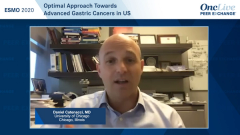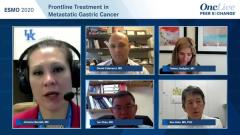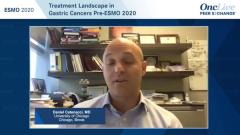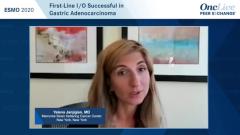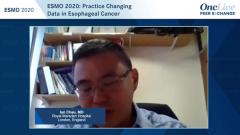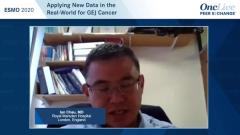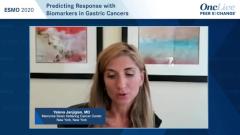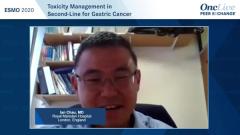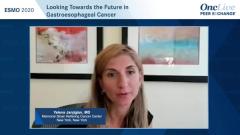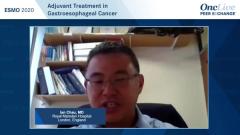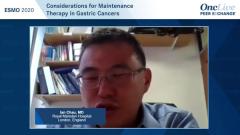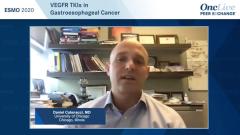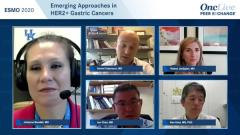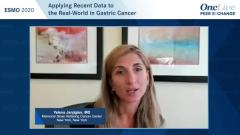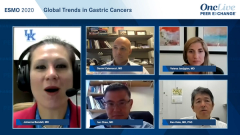
Maintenance Therapy in Gastric Cancers
Episodes in this series

Transcript:
Johanna Bendell, MD: Let’s talk about what’s coming, what’s emerging, and what’s the next thing to come out. Currently, we have several approaches with chemotherapy that are under investigation. Ken, can you tell us a little bit about the SOLAR study [NCT02322593] that’s going on in Asia?
Ken Kato, MD, PhD: The SOLAR study is first-line phase 3 trial compared to the S-1 plus cisplatin to the TAS-118. TAS-118 is combination with S-1 plus leucovorin and oxaliplatin combination therapy. The primary end point of overall survival was met. The results of the study are positive, but a slightly higher proportion of the adverse event was seen in the TAS-118 plus oxaliplatin arm, especially the grade 3 and higher diarrhea. The overall response rate was achieved in 73%, amazingly, of patients in the TAS-118 plus oxaliplatin arm, but the PMDA [Pharmaceuticals and Medical Devices Agency] is not approved, and the pharmaceutical company does not submit an application to PMDA. I think the higher response rate is very good for the patient who had a higher tumor burden and ended up with progressive disease in the symptomatic patient. Finally, the TAS-118 is not approved even in the Asian countries.
Johanna Bendell, MD: Thank you so much. Interesting, TAS-118, a new novel fluoropyrimidine combination to try to improve, but certainly toxicity is an issue. What about this concept of maintenance and switch maintenance for gastric cancer treatment? Ian, can you talk with us a little bit about the ARMANI study [NCT02934464] and the JAVELIN Gastric 100 study [NCT02625610]?
Ian Chau, MD: The PLATFORM study [NCT01943903] I’d like to talk about as well. We heard that do you treat a patient first line with 6 to 8 cycles or 4 to 6 months of treatment. Do you continue, do you do an Optimox where you drop oxaliplatin but continue 5-fluorouracil? There are certainly different practices around the world. If you take others, perhaps talking about the JAVELIN 100 study … a phase 3 study that was presented earlier in the year at the American Society of Clinical Oncology Gastrointestinal Cancers Symposium where the patient had first-line chemotherapy, and then they were randomized to continue the same chemotherapy versus avelumab. Unfortunately, in that study, a patient who switched to avelumab, although some … had additional responses, that did not translate into any improvement in overall survival in that study. Maintenance avelumab is not going to be a treatment option.
We conducted an academic study, the PLATFORM study, which also presented in the same meeting in our very initial, interim analysis, where the standard of care in the UK is that you stop chemotherapy after 6 or 8 cycles, so up to 4 to 6 months of treatment, where you stop treatment completely. Patients were randomized in 1 of the arms to continue with capecitabine alone, and then a third arm to durvalumab. We got 2 other arms that we haven’t reported data yet because they’re still recruiting, with a Poly (ADP-ribose) polymerase inhibitor in a fourth arm and a fifth arm being capecitabine and ramucirumab, so those arms are still recruiting.
From what we at least know in the interim analysis is continuing, durvalumab does not have an early detriment…. We’re still waiting for the study that we recruited just about 125 patients in that arm. The whole study has got about 400 patients so far, so we’ll wait for those data to come.
We haven’t proven that maintenance therapy is of benefit, but it is used in many different institutions in many countries…. Certainly, around the world, many clinicians will use that as a strategy, but I think it … also depends on the patient preference. Some patients want to stop treatment completely; some patients want to have their treatment going.
Transcript Edited for Clarity


